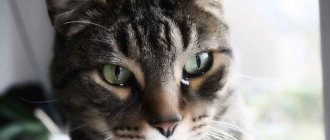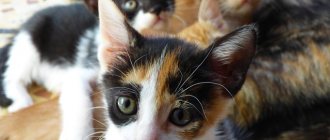Despite the fact that most people consider cats to be quite calm and even somewhat indifferent creatures, four-legged pets are just as susceptible to stress as people. Any situation can cause concern: a beloved owner going on vacation, a preventative trip to the veterinary clinic, the arrival of a new family member or a furry neighbor.
It is useful for owners to know several techniques and be able to calm a cat in a stressful situation and help it adapt smoothly to new circumstances.
But be careful, the influence of some of the remedies (including popular ones) has not been fully studied. Perhaps they could be harmful. Be sure to consult your veterinarian.
How anxiety manifests itself
Stress in a cat can manifest itself in different ways and includes four main reactions.
Nervous behavior
The pet begins to purr and lick itself more often than usual; bald patches may then appear in these places. If there are no parasites on the fur, then such actions indicate overexertion. Sometimes licking is accompanied by a change in appetite - the animal either begins to eat too much or refuses to eat at all.
Trying to hide
The second sign that an animal is experiencing fear is its desire to crawl into a secluded place and not show itself until the irritating factor disappears. Most often, cats are frightened by loud noises, strangers, other four-legged animals, or new habitats.
Aggression
Sometimes, instead of fear, cats experience the opposite reaction - aggression. When in a highly agitated state, they can attack other animals or people. Most often, this reaction is characteristic of males protecting their territory, or females protecting their cubs.
A trip to the veterinarian or sounds that the cat cannot identify can trigger a desire for aggressive defense.
It is not difficult to determine that an animal is in an aggressive state:
- tries to appear larger to others than he really is: fluffs his tail, arches his back;
- makes hissing, snorting and other threatening sounds;
- the pupils narrow, the eyes concentrate on the object of attack;
- the tail twitches with excitement;
- when trying to get closer, the front paws are used.
Read the article about the most evil cat breeds that exist today.
Panic
The highest stage of manifestation of nervous overexcitation is a panic attack. In this state, the animal emits terrible screams, accompanied by profuse salivation. The fear may be so intense that involuntary urination or defecation occurs. In this case, the ears are pressed firmly to the head, the pupils are dilated, not narrowed. The cat shrinks and presses itself to the ground.
Aggression caused by irritation
Remember yourself when you come home after a hard day. The boss scolded me, there was a difficult client, and in the evening the conductor on the bus was rude. Of course, there is something to be irritated about. This happens with a cat too. At the same time, you can see how the pet suddenly changes. For example, you are petting a cat, and suddenly his calm reaction turns into a hiss? There are no apparent reasons, but the pet is ready to attack anything that happens to be nearby.
What should you do if your cat becomes aggressive so suddenly? Assess your pet's condition. If he suddenly starts beating his tail on the floor, it means you need to leave your pet alone. Sometimes, in response to measured stroking, the pet begins to frantically beat the owner with its paws. There is no need to shout at him, much less hit him - everyone is in a bad mood.
It is noteworthy that aggression arising from irritation is most often temporary and suppressed. The cat clearly does not want to harm its owner. It lunges at a person, but the claws are hidden, and there are practically no bite marks left. What to do if the cat is angry and aggressive? We need to let her come to her senses. It's best to do nothing for now.
Sometimes a cat's aggression is caused by irritation. This happens rarely and appears completely unexpectedly. For example, you are petting a cat, and its calm reaction suddenly gives way to aggression. There are no apparent reasons, but an aggressive cat is preparing to attack anyone who happens to be nearby.
The main sign of irritation is tail hitting. If the cat was calmly accepting your affection all the time, and at one point began to beat its tail on the floor, you should know that it is irritated. Sometimes the cat perceives measured strokes on the stomach differently than before and begins to frantically beat the owner with its hind paws.
What to do at home?
In cases where it is not possible to identify the cause of hostile behavior on your own, a number of steps should be taken.
Comprehensive examination
- Take your pet to the veterinarian to rule out dental diseases.
- As recommended by your doctor, use blood tests and ultrasound to rule out or confirm kidney and liver failure.
- After undergoing an X-ray examination, identify the presence of diseases of the musculoskeletal system.
Creating optimal conditions
The ideal environment for cats is an opportunity to hide. If she does not have her own house, then an ordinary cardboard box, basket, or carrier can be used as a shelter.
The main thing is that no one disturbs the pet there. A calm environment is also important when eating and going to the toilet.
Medication assistance
If aggression is associated with behavioral factors, then “first aid” to relieve an attack can be provided by the drug Feliway, which is rightly called a behavior corrector. It contains an artificial analogue of the pheromones secreted by cats in a calm environment, and helps an excited animal quickly calm down.
Changing your diet
If the cause of stress is hormonal changes in the animal’s body, then experienced veterinarians suggest changing the diet, reducing the amount of food in one serving, but at the same time increasing the number of feedings.
A lighter meal is recommended before bed. The water in the drinking bowl should be fresh and clean.
Insulation
To calm your cat, it is sometimes helpful to isolate it from other animals and irritants. Having allocated a separate room, you need to provide her with the usual food and clean water, and put a heating pad under the bedding. In a hyperactive state, it is not recommended to let your pet outside, much less allow it to contact its relatives.
Music therapy
The beneficial effect of classical music on the emotional state is experienced not only by people, but also by animals, especially sensitive ones like cats.
Each pet has its own preferences, but the works of Mozart, Beethoven and other famous composers can restore the emotional background.
More attention
As with any restless creature, when stressed, a cat needs extra attention and affection. More often you need to hold her in your arms, massage or stroke her, and also “talk”.
Shock bath
Everyone knows that representatives of the cat family do not like to swim. Therefore, doing this will be the right decision in order to bring him to his senses.
After bathing, the animal will need time to dry and get its fur in order. All these actions are aimed at switching his attention, as a result of which nervousness decreases.
Play aggression
A cat may show excessive “zeal” during play: it can attack the “toy”, torment it, and at the same time it can scratch or bite the person playing with it, and ruin the things it plays with. Knowing this feature of your pet, you should not provoke his aggressive behavior: you should play with him less or temporarily abandon games.
Sometimes the reason for a cat’s aggression lies on the surface: cats are playful by nature and aggression in some cases is increased playfulness. The main sign of playful aggression is suddenness.
READ Dangerous disease of cows – endometritis
Folk remedies
Often traditional methods of treatment alleviate the condition, but not for long. In addition, some of the products may be harmful to the health of the animal :
- Butter - spread it on the face. Instinctively, the cat will begin to lick the substance that it feels on the fur, and will do this until it calms down.
- Take baking soda on the tip of a knife and add it to the milk, then pour it into a bowl.
- Pharmaceutical herbs: chamomile, lemon balm, mint, also have a beneficial effect on restoring the pet’s nervous system. Methods for preparing each of them are written on the packaging.
- Diphenhydramine and valerian are popular remedies in the past. This combination can have a calming effect. However, valerian can be harmful! It is not recommended to give it.
A game
Most often this is a feature of the behavior of small kittens. Nature has it in such a way that fluffy balls play out life situations. This applies to fights and defending their territory, but at home, grown-up pets sometimes don’t mind frolicking like little ones.
Aggression can be caused by increased playfulness. The distinctive feature is suddenness. If your pet jumps on you from around the corner, starts hissing and extends its claws, then most likely it is just bored and wants to have fun. He can run sideways around the room, brake sharply, snort and bounce like a ball.
Mr. Cat explains: when is stress expected?
A visit to the veterinary clinic, going on vacation with the owner, or moving to another place are all situations that can make your cat nervous. To help the animal tolerate them more easily, a little preparation is necessary.
Suitable carrier
To move an animal from one room to another, it is better to purchase a carrier. It must correspond to the size of the animal, the floor is covered with warm material, for example, a blanket. You can also cover the top of the portable cage with either a cloth or, if it is cold, a blanket.
The carrier will ensure the safety of both the pet and the owner. After all, if an animal is in your hands, then, frightened, it can scratch a person, or even worse, break free and run away so that it will be difficult to find.
Medication support
The range of sedatives is very wide; you can buy any without a prescription at a veterinary pharmacy. The most common ones include: Kot-Bayun, Phytex, Stop-stress drops.
If a visit to the veterinarian or a move is planned, then it is very important to start taking medications two to three days before the expected date, since it takes time for the pet to feel the effect of taking them.
Specialized food
Dry food manufacturers have provided a special diet for cats that may find themselves in a stressful situation. In such cases, nutritional therapy begins ten days before the planned event and continues for two months. The best supplements are Kalm (manufactured by Royal Canin) and Urinari Stress (manufactured by Hills).
"Displaced" aggression
If the cat has become aggressive, then it is possible that there is something or someone influencing his behavior. If the object of the cat’s irritation is out of reach, then the aggressive cat can take out its rage on you and those around you.
If your aggressive cat starts to growl when he looks at the door, then most likely the source of the aggression is one of your friends who often comes to see you. Maybe someone is bothering your pet too much. If an aggressive cat is nervous and hisses while sitting on the windowsill, then it is likely that a neighbor’s cat or dog with whom he has a difficult relationship has come into his field of vision.
In an emergency
If your pet is in an unexpected situation and is in a state of shock, then it is best to take a few simple but effective steps.
To keep distance
If the animal is in an excited state, then no amount of caresses or persuasion can calm it down.
The best thing in this situation is to allow privacy in your favorite room, box, or carrier. You can pet it later, when it comes to its senses.
Keep calm
Cats are extremely sensitive creatures, and the owner’s nervousness is instantly transmitted to them. Therefore, if the owner is no less afraid of the veterinarian than the pet, then it is better to entrust him to another, calmer family member for a while.
If an animal is stressed for another reason, then seeing and feeling calm on the part of a person, it will calm down faster.
Radiate calm
Another way to restore your cat’s self-control is to use calm and affectionate words addressed to her. Hearing the soothing sounds of a loved one’s voice, she will understand that there is no danger. For those who consider “talking” a stupid idea, it’s time to try your telepathic abilities - you need to instill benevolent intentions.
Exercise caution
No matter how small and weak a cat may seem, nature has endowed it with sharp teeth and claws, which can cause serious injuries not only to its relatives, but also to larger animals and humans. Therefore, if vaccinations and other medical procedures are upcoming, it is better to secure the animal at a time when it is calm in a special bag.
If you have to bathe, which domestic cats fear no less than the doctor, then manufacturers also offer special non-traumatic nets.
In any case, before working with an animal, you need to protect yourself as much as possible from possible injuries.
Switch attention
If a cat is ready to attack, then the best way to avoid a collision with an angry animal is to divert its attention. You can spray water in its direction, for example, from a spray bottle. If it is not at hand, then from any other container.
An object thrown to the side will also divert the attention of the furry aggressor to him, and not to the person, and will give him time to retreat.
Causes of restlessness
There are plenty of reasons for concern for such a small animal. In domestic cats, this is the importunity of children and adolescents, harassment of other pets. A street cat suffers from dogs, cold and hunger, contenders for its territory.
Fear and danger
Fear and danger cause a defensive reaction. When defending itself, the cat first tries to avoid conflict; it will not enter into confrontation. And when it becomes clear that there is nowhere to retreat, the animal goes on the attack.
The cat always shows with its appearance that it is ready to defend itself to the last
Defending your territory
The cat is a territorial animal. Its habitat in nature is quite extensive. The invasion of a stranger always causes aggression. After all, this threatens to reduce the amount of food, loss of safety of recreation, and limit the attention of females/males. It’s even more difficult for a cat in an apartment.
She is forced to share small square meters with the rest of the family and pets. Therefore, the appearance of newcomers in the house (no matter whether people or animals) will inevitably lead to aggression, at least at first.
In my yard there lives a very lively, I would even say fighting, cat. Before her appearance, some strange mustaches were constantly “snooping” under the windows. They were apparently scouting an area free of competitors and dogs. This cat also came from somewhere, but she took root, we started feeding her, and she stayed with us forever. While she was not yet sterilized, male strangers used to come into the yard. But they received such a scolding from her that we never saw them again. Now the cats have lost interest in our yard, but still, no, no, someone is checking to see if the space is free. Then I hear terrible sounds under the window. My cat doesn’t even hiss, it’s as if she spits at strangers and rushes towards them with great speed. Sometimes it seems to me that I don’t even need a dog, I already have an excellent guard.
Overexcitement
Overexcited cats rarely result in serious injury for owners. It usually occurs during violent games. Cats are hunters, and this instinct is inherent in them at the genetic level, even if the kitten’s ancestors never caught prey on their own. If overexcited, the cat may strike with its paw or bite lightly. In this way she signals her dissatisfaction. It is enough to simply stop playing and leave the animal alone.
In a state of overexcitation, a cat can injure its owner, but does not do so on purpose.
My mom has a kitten. He is now about 6 months old. When my children play him until he gets overexcited, he stops playing and starts running around the rooms, curtains and, in my opinion, even the ceilings. In this case, it is better to simply get out of the path of his movement, because he runs with his eyes wide and, it seems to me, not on the pads of his paws, but right on his claws. This surge of energy does not last long. The cat just runs out of steam and goes into the bath to lap up the water.
Maternal aggression
Maternal aggression is defensive in nature. Since this instinct is one of the strongest, its manifestations can be bright to the point of recklessness. The cat will protect its offspring to the last. Of course, in a house where there is trust between the mother cat and the owner, such cases are excluded. Mostly children suffer, as they may accidentally hurt the kitten. The baby's squeak can infuriate the mother, and she, trying to protect the kitten, can rush at the offender.
Maternal instinct is the strongest. the cat will fight to the death, protecting the kittens from the stranger
Disease
A sick animal experiences a whole range of negative feelings: from fear to complete hopelessness. Touching the body and medical procedures cause pain. An animal, feeling its weakness, can only defend itself. Of course, the cat in such a situation will release its claws and bite.
Hormonal surges and disruptions
Another reason for aggression is hormonal imbalance. It occurs during the period of sexual hunting as a result of dissatisfaction. And if this happens for years (as in many pets), the pet is guaranteed to become nervous. Moreover, this problem has a recurring nature if it is not solved in radical ways.
Veterinarians recommend castrating animals that are not planned to be introduced into the breeding program.
Video: reasons for a cat's aggressive behavior
Drugs for sedation
Folk remedies in the form of herbal preparations based on catnip have a mild effect without harming the health of the pet. Medicines containing motherwort, hops and mint are available in the form of tablets, drops, and sprays. Their feature is a cumulative effect, and not an instantaneous effect, so the course of treatment begins in advance. Medicinal sedatives with universal action, in addition to herbs, contain chemicals. Hormonal drugs act quickly and strongly, helping to pacify a rabid cat during sexual heat. When choosing a drug to calm your furry pet, you need to clearly establish the cause of the aggression. Only a veterinarian can prescribe a suitable sedative.
Sterilization and its consequences
After castration, cats usually become much calmer. Often this is the determining factor for the owner who decides to undergo surgery. Unfortunately, this is not always true for females. Often a veterinarian is asked that a cat is aggressive after sterilization. What to do in this case? We need to look again at the reasons. There can be three of them:
- Stress factors.
- Internal influences.
- External stimuli.
Very often the animal has pain in the seam, and this seriously affects its behavior. Consult your veterinarian, he will prescribe painkillers. In addition, if a change in hormonal levels is observed, it must be immediately corrected with the help of special medications.











